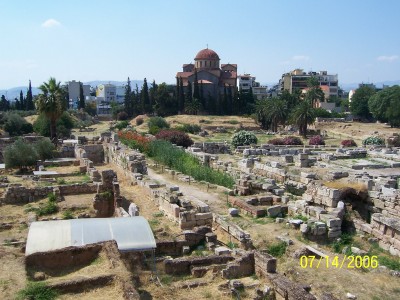|
Stoa
Poikile

Found in the ancient agora, the stoa
poikile, was where the Philosopher Zeno introduced stoicism.
They are not 100% sure where the stoa poikile is, although it is
likely partially underneath a restaurant and perhaps even the
subway tunnels.
Since they are not sure of where the stoa poikile is, I have
used this picture of a road through the agora because Zeno, the
founder of Stocism, came from Cyprus, an island near Greece and
would have had to walk to Athens to get there. The ancient agora
in Athens was a hub of activity, both commercial and
intellectual!
How is the Stoa Poikile and Stoicism significant
for
understanding the world of Paul?
In Paul's speech at the Areopagus Paul quotes two
philosophers/poets:
For 'In him we live and move and have our being,' as even
some of your poets have said, 'For we too are his offspring.'
(Acts, chapter 17, verse 28)
The first quote is based on Epimenides of Knossos (6th century
B.C.). The second quote is from Aratus of Soli, a third-century
B.C. poet from Cilicia.
What is Stoicism?
Although neither of these two
philosophers/poets were the leading writers of antiquity, they
articulate a stoic world-view. Stoicism was founded around 300
BC by Zeno. Zeno moved to Athens and began teaching at a stoa
poiliki near the ancient agora.
Stoicism appealed to the cosmopolitan nature of the Roman
empire. Rather than pay tribute to local patron gods or even
acknowledge the various divinities of the religions from across
the Greco-roman world, Stoicism argued that all gods were merely
facades of the greater god/spirit/organizing principle. This
organizing principle, called the logos, was fundamentally
rational. To live a good life was to live a reasoned life, in
tune with the cosmos. Hence the idea that a stoic person shuns
emotions. (In general, passion was not looked upon as a good
thing in the ancient world, but a sign of possession and a loss
of control). In some ways, the
logos in stoicism is very analogous to the force from Star Wars.
Obi-Wan Kenobi describes the force as "an energy field created
by all living things. It surrounds us, penetrates us, and binds
the galaxy together." Same idea as the logos.
Later stoicism would pick up dualism (the belief in extreme good
and evil in conflict), even making this a closer parallel.
In short, stoic thinking never really left us and still has much
appeal to our imagination. At some level, it empowers humanity
by raising humanity to the level of gods. There is divinity
within each one of us, just waiting to be actualized or
realized.
 How is Paul
remixing
the culture of his day?
How is Paul
remixing
the culture of his day?
Ultimately, stoic philosophy makes a fundamental claim contrary
to Christianity. In stoic philosophy, God is not simply in
everything but rather is everything. There is no otherness of
God. You, the cloud and the tree all add up to the divine
principle. In Christianity, God is transcendent and not simply
existing within but enabling human activity.
Paul appeals to the stoic notions of an over-soul, but quickly
starts to make new claims about the divine, even claiming that
God demands human repentance:
Therefore having overlooked the times of ignorance, God is
now declaring that all people everywhere should repent (chapter
17, verse 30).
Yet even here, Paul is reworking the culture. In Hebrew, the
word repentance has clearly religious overtones and is part of
the solution to sin. In Greek, the word has a more basic
meaning: "turned/renewed thinking." More over, the problem Paul
describes here is not sin, but ignorance. Paul knows an audience
of Greek philosophers would not hear sin and repentance they way
a Hebrew one would, so he adjusts to hit the nail on the head.
To the philosophers he tells them they need a new way of
thinking.
This way of thinking involves the resurrection of the dead,
something beyond the standard thinking of stoicism.
sources:
info on stoicism:
Koester, Helmut. Introduction to the New Testament.
Philadelphia: Fortress Press, 1982.
http://www.biblegateway.com/resources/commentaries/?action=getCommentaryText&cid=5&source=1&seq=i.51.17.3
obi-wan kenobi: http://en.wikipedia.org/wiki/Force_(Star_Wars)
|



